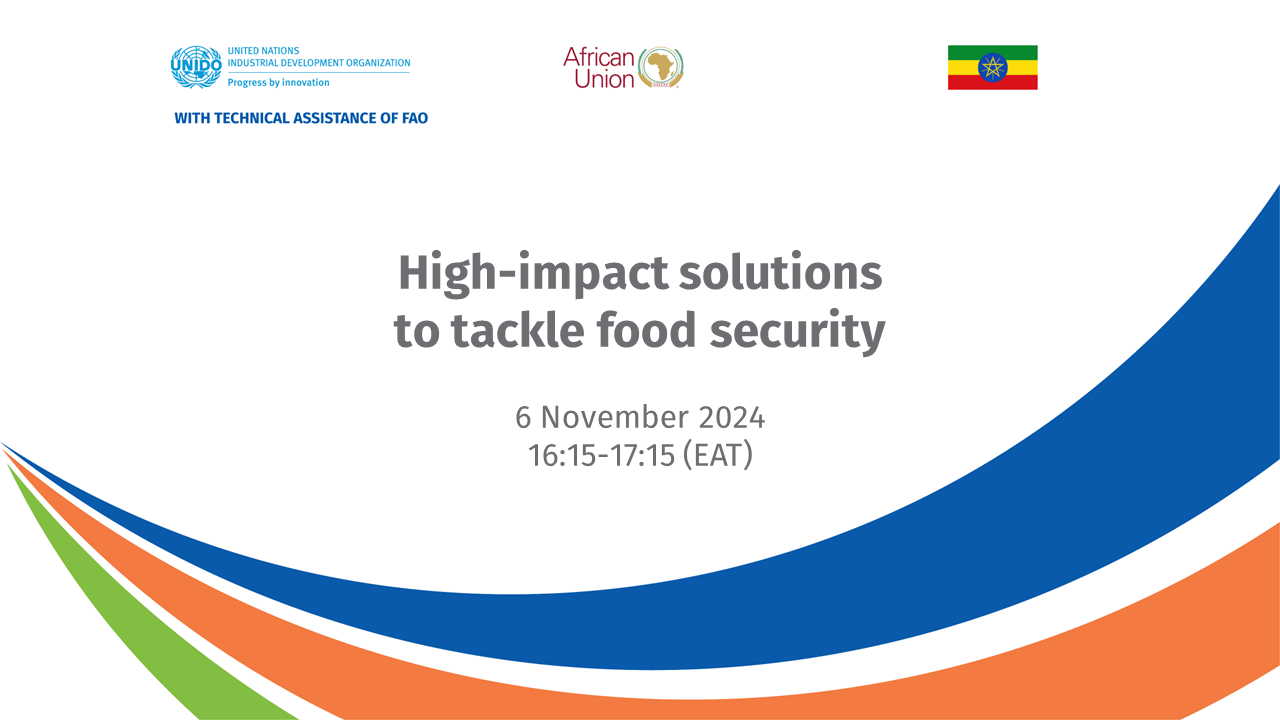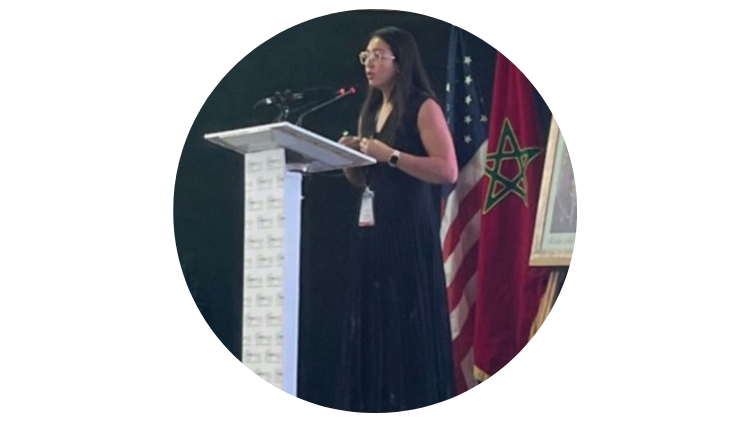


The issue:
The issue of global hunger remains one of the most pressing humanitarian challenges of our time, due to complex challenges such as climate change and inefficient food systems.
Developing nations are actively pursuing the modernization of traditional agriculture practices to bolster food safety and security. However, transitioning from subsistence-oriented production systems to more sustainable, market-oriented ones demands substantial improvements across the entire agri-food value chain, starting from farm-level productivity, to mechanization, storage and logistics. Such a transition necessitates investments, technology, scalable innovations, and the buy-in of governments and stakeholders alike.
Sustainable agri-food chain transformation has a need for tailored, high-impact solutions that consider factors such as climate, infrastructure and socio-economic conditions. High-impact solutions to transform food systems can drive significant positive change across multiple dimensions. They have the power to tackle food security, environmental sustainability, and livelihoods by involving a combination of strategies, such as investing in rural development, reducing food waste and post-harvest losses, and building resilient value chains.
A comprehensive transformation requires a multifaceted approach that encompasses technological advancements, policy reforms, and collaborative partnerships. The private sector is needed to bring innovation, efficiency, and investment to food systems. Governments, on the other hand, need to provide policy frameworks, regulatory support, and public investments to create an enabling environment for food system transformation.
As an example, smart farming, advanced technologies and the use of data-driven insights play a pivotal role in creating resilient food systems and optimizing a sustainable use of resources by reducing the environmental footprint. Innovative technologies can enable farmers to make informed decisions, minimize waste, conserve water and enhance their agricultural practices, which is fundamental to a thriving food system.
Equally crucial is the efficiency and resilience of supply chain distribution. Robust infrastructure, efficient logistics with strong regional and global connections are also critical components to reducing food waste and to sustainably transform food systems. By optimizing transportation, storage, packaging and distribution, food losses can be substantially reduced.
To achieve these goals, a synergistic and integrated approach by fostering collaborative partnerships, and implementing supportive policies is needed to successfully implement high-impact solutions to address market fragmentation and improve food security.
Objectives:
This session will explore the opportunities for innovative, collaborative, and high-impact solutions to address global food security challenges. It will focus on partnerships between the private sector, government, and other stakeholders to develop scalable solutions that can be replicated across diverse contexts to sustainably transform agri-food value chains by considering:
The multidimensional impact: Identification of high-impact solutions that can drive positive change across various dimensions, including food security, environmental sustainability, and livelihoods.
An integrated approach: Discuss which policy reforms and collaborative partnerships are needed to support the design and implementation of innovative solutions to drive transformative change.
Key guiding questions:
What are examples of high-impact solutions that have been successfully implemented in agri-food supply chains to improve efficiency, reduce waste, and enhance sustainability?
What are the key characteristics of high-impact solutions to transform agri-food systems?
What are the most critical gaps that need to be addressed to enable more effective decision-making and problem-solving in agri-food supply chain transformation?
How can partnerships between governments, businesses, and civil society organizations be leveraged to develop and implement high-impact solutions?
How can we ensure that innovative food security solutions are equitable and inclusive?
Expected outcomes:
Explore the role of policies and private sector collaboration: Attendees will walk away with lessons learned on the importance of integrating technological advancements, implementing supportive policies, and fostering collaborative partnerships in driving sustainable agri-food chain transformation, including specific examples from the panelists.
Enhanced multi-stakeholder collaboration to drive forward long-term, sustainable agri-food transformation: Participants will gain insights into how innovative high-impact solutions can contribute to improved food security, reduced environmental impact, and enhanced livelihoods. They will also understand how these solutions can create positive side effects across various sectors.
Session format and structure
This high-level moderated discussion will showcase successful high-impact initiatives and will set the tone for future partnership-based solutions with the private sector as catalyst.
Moderator

Ms. Anne Muraya, Chief Executive Officer, Deloitte East Africa
Anne Muraya is the CEO of Deloitte East Africa, overseeing the firm’s operations in Kenya, Uganda, Tanzania, Ethiopia, Malawi, and Zambia. Previously, Anne has served in different capacities as Audit leader for East Africa, Deloitte Africa's Managing Partner for Responsible Business and Public Policy, and she also served on the Deloitte Global Advisory Council
Anne was also a member of the Professional Standards Committee of the Institute of Certified Public Accountants of Kenya (ICPAK). In 2020, she was inducted into the College of Fellows of ICPAK in recognition of services rendered to the profession.
She gives back by mentoring girls and women.
Panelists

Mr. Richard Vattay, Founder and Director of Water&Soil Ltd
Agricultural machinery engineer and serial entrepreneur. In the 1980s worked in the cork industry and in the financial sector in the field of innovation funding. Between 1989 and 1992 he was the CEO of Innovar Leasing Ltd. and Board Member of PVL Leasing Rt. 1994 and 1996 he was the Chairman of the Supervisory Board of Interbanka in Prague. 1994-2014 he was an owner of Epho Ltd., specialising in research and development projects. 1990 and 2015 CEO of the First Hungarian Factor House. Since 2014 is founder and Director of Water&Soil Ltd.

Ms. Lay Pheng Ooi, Chief Executive Officer, Berjayapak
Ms. Lay Pheng Ooi, Executive Director and Group CEO of L&P Global Berhad and CEO of Berjayapak Sdn. Bhd., a leading packaging solutions provider. Under her leadership, the company expanded from one location to five across Malaysia and Vietnam. She listed the group on KLSE Main Market in 2024. A recognized thought leader in sustainability within the packaging industry, she holds a Master of Arts in Economics and is a strong advocate for continuous learning in business.

Mr. Pramod Bagalwadi, Chief Executive Officer, East Africa and Vice President, Customs & Regulatory Affairs: Middle East & Africa Region, DHL Global Forwarding
Pramod Bagalwadi was appointed CEO, East Africa in Jan 2024 in addition to his role as VP Customs & Regulatory Affair, MEA based in Kenya. Prior to this appointment, he has held various strategic positions within the Middle East and Africa Region based on the strategy of the organization supporting the growth of this Region..
Mr Bagalwadi brings with him over 25 years of experience in logistics and supply chain management having worked in India, Middle East and Africa. His contributions include effective management of agent partners, expansion of footprint in Africa, launching new products like Industrial Projects, International Supply Chain Solutions, Saloodo and other Digital & Innovative Solutions to enhance Customer Centricity with the right management team on ground to deliver quality service consistently.
He takes pride in his leadership style of “people first supported by robust processes” and for the past 20 years, has been instrumental in developing the region’s performance while consistently delivering positive results. Mr. Bagalwadi is a post graduate with specialization in Procurement, Marketing and Supply Chain holding membership in Chartered Institute of Procurement and Supply (CIPS), London. He is an Indian citizen with fluency in both English and Hindi.

Mr. Steffen Tiemann, Vice President for Africa and Middle East, CLAAS
With over 26 years of experience in the agricultural machinery industry, Mr. Steffen Tiemann has been the Vice President for Africa and the Middle East at CLAAS since December 2019. Prior to this position, Mr. Tiemann held several strategic leadership roles at CLAAS. His responsibilities have included optimizing product costs and coordinating procurement strategies on a global scale. With a career at CLAAS spanning more than two decades, Mr. Tiemann is recognized as a leader in innovation and efficiency in the agricultural machinery sector.

Ms. Ikram Chahlaoui, Strategy Manager, Food Security & Innovation, Middle East and Africa Region, Bühler Group
Ikram is a Strategy Manager at Bühler Group, a global leader in food processing and technology committed to sustainable solutions for equitable access to healthy food. In this role, Ikram drives the company’s food security strategy, and strategic partnerships, ensuring bridges are built to foster a healthier, more sustainable future throughout the Middle East and Africa.
With a background in industrial engineering, management consulting, and strategy, Ikram has worked across multiple markets and is now based in Dubai, overseeing operations across the Middle East and Africa. Central to Ikram’s professional journey is a commitment to engaging in dialogue and collaboration with diverse stakeholders, leveraging a transversal approach to unlock creative solutions. Known for her entrepreneurial spirit, and multicultural outlook, Ikram combines strategic insight, leadership, and data-driven action to help create a world where everyone can access nutritious food and better health.

Ms. Tabitha Njuguna, Managing Director, AFTL Kenya
Tabitha Njuguna is the Managing Director, AFEX Fair Trade, Kenya and has garnered over 10 years of experience in grants management, inclusive finance, economic development, agribusiness, energy, and financial inclusion funds, spearheading projects from inception to close out in East and West Africa, and the United Kingdom. In her role, she develops and evolves the strategic direction for the company’s commercial objectives in Kenya, while nurturing a strong leadership team to drive its execution.
Over the years, Tabitha has had extensive experience in driving transformation for international enterprises, executing business transactions, and managing successful acquisitions. Prior to joining AFEX, she held leadership positions at firms like KPMG Kenya, and Africa Enterprise Challenge Fund among others. She is passionate about developing bespoke solutions that optimally address business challenges.
She holds a master’s degree in Agricultural Economics from the School of Oriental and African Studies (SOAS), University of London, and a Bachelor of Business Management in Finance, Moi University, Kenya.